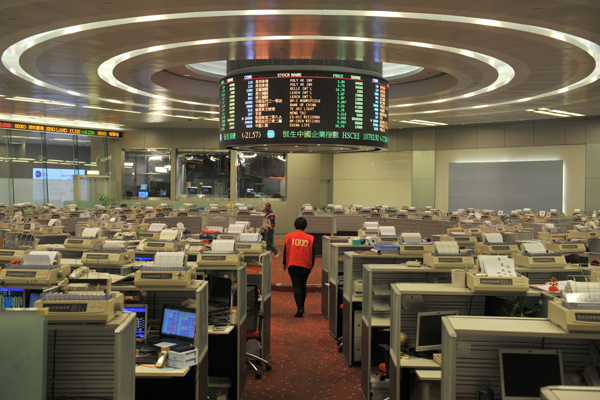Tuesday, 25 August 2015 13:28
 HONG KONG: Asian shares were mixed after a see-saw session on Tuesday, with Tokyo and Hong Kong diving as Shanghai extended its worst rout in almost 20 years, while other regional markets bounced into positive territory.
HONG KONG: Asian shares were mixed after a see-saw session on Tuesday, with Tokyo and Hong Kong diving as Shanghai extended its worst rout in almost 20 years, while other regional markets bounced into positive territory.
The dollar was weak against other currencies and oil prices remained in the doldrums after finishing Monday below $ 40 a barrel for the first time in six years.
Tokyo dropped nearly 4.0 percent to close 733.98 points lower at 17,806.70 — its sixth straight day of falls and the lowest finish since mid-February.
Shanghai plummeted more than eight percent in mid-afternoon trading, continuing its worst four-day rout since 1996, while Hong Kong tumbled 0.70 percent.
But other regional share markets bounced back into positive territory after a bruising session overnight that saw Wall Street fall the most since the height of the financial crisis and European equities slump.
Sydney closed higher, adding up 2.72 percent or 136.02 points at 5,137.30, while Seoul rose 0.92 percent, or 16.82 points, at 1,846.63.
“It will take a big policy reaction out of China” to trigger a proper rebound in global shares, Isao Kubo a strategist at Nissay Asset Management, told Bloomberg News.
“It’s best to expect high volatility for the forseeable future rather than jump to conclusions about if this is the end or not.”
– ‘Running out of room’ –
=========================
Global equities took a battering overnight, with US and European markets plunging after an almost 8.50 percent slump in Shanghai — the heaviest daily loss since 2007 — sparked panic among world investors.
World equity markets have seen some $ 5 trillion wiped off their value since China’s surprise devaluation of the yuan on August 11 added to fears the world’s second-largest economy is weaker than thought.
Chinese shares have been on a roller-coaster ride after a year-long debt-fuelled rally collapsed in mid-June, prompting the government to unleash a vast package of measures to support shares.
Dealers said the lack of fresh support for the market or new monetary easing measures the market had been hoping for had knocked investors’ confidence.
“That shows to investors around the world the Chinese are running out of room in terms of being able to support the market,” Ankur Patel, chief investment officer at R-Squared Macro Management, told Bloomberg News.
The dollar remained weak at 119.16 yen, up from 118.51 yen in New York trade Monday, but dramatically weaker than 122.06 yen seen in US trading on Friday.
The euro stood at $ 1.1550 and 137.63 yen in Tokyo, compared with $ 1.1606 and 137.55 yen in New York overnight.
US benchmark West Texas Intermediate (WTI) for October delivery was trading at $ 38.71 after closing at $ 38.24 a barrel on the New York Mercantile Exchange, its first below-$ 40 close since February 2009.
Brent North Sea crude for October, the international benchmark, was as $ 42.86 a barrel after closing at $ 43.04 a barrel in London, its lowest level since March 2009.
In other markets:
— Taipei added 3.58 percent, or 265.30 points, to 7,675.64.
Taiwan Semiconductor Manufacturing Co rose 7.39 percent to Tw$ 123.50 while Hon Hai Precision advanced 4.17 percent to Tw$ 85.0.
— Wellington added 0.11 percent, or 5.98 points, to 5,613.29.
Contact Energy rose 2.70 percent to NZ$ 5.32 and Air New Zealand was down 0.75 percent to NZ$ 2.65.




























